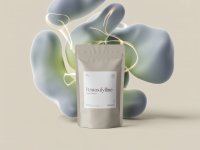
Resveratrol
Description
Resveratrol is a naturally occurring polyphenol found in various plants, most notably in red grapes and red wine. It has garnered significant attention for its potential health benefits, including cardiovascular protection, antioxidant activity, and anti-inflammatory effects. This article provides a comprehensive overview of resveratrol, exploring its uses, effectiveness, dosage, potential side effects, and interactions.
Quick Overview: Resveratrol At-a-Glance
- Key Benefits: Potential cardiovascular support, antioxidant properties, and anti-inflammatory actions.
- Primary Mechanism: Acts as an antioxidant and may influence various cellular pathways.
- Best For: Those seeking potential support for heart health and antioxidant protection.
- Typical Dose Range: 250-1000mg daily, as indicated in studies.
- Key Caution/Consideration: Potential gastrointestinal side effects at higher doses, interactions with certain medications.
Table of Contents
Categories & Effectiveness
Learn about our rating methodologyBrain Health
Brain Circulation Boost
7/10Strong evidence of effectiveness
Neuro-Repair Support
6/10Moderate evidence of effectiveness
Brain Antioxidant Shield
3/10Limited evidence of effectiveness
Cognition
Memory & Recall
3/10Limited evidence of effectiveness
Mood & Stress
Mood Elevation
3/10Limited evidence of effectiveness
Systemic Health
Vascular Health
3/10Limited evidence of effectiveness
Dosage & Side Effects
Recommended Dosage
- Start low: Begin with a lower dose to assess your tolerance.
- Consult a doctor: Get personalized dosage advice based on your health profile.
Potential Side Effects
Bioavailability & Half-Life
Interactions & Stacks
Recommended Products
NEU: Resveratrol Plus hochdosiert | 500mg Premium Trans Resveratrol aus Schweiz je Kapsel | Optimierte Formel mit Quercetin | Laborgeprüfte Qualität aus DE | 60 Kapseln
- Rated 4.7 stars by 127 customers
- Special offer: Spare 3,00 € mit Rabattgutschein
NAD+ Resveratrol Boosting Supplement, 1000MG NAD+ Supplement überlegene Alternative, Hohe Absorption, Effizienter für Vitalität & Gesundheit
- Rated 4.7 stars by 664 customers
- Premium quality ingredients
EXVital® Resveratrol Kapseln, 98% Trans-Resveratrol, 500mg pro Kapsel, 120 vegane Kapseln, vegan & ohne Zusätze, laborgeprüft
- Rated 4.7 stars by 65 customers
- Premium quality ingredients
As an Amazon Associate we earn from qualifying purchases. Prices and availability are accurate as of the date/time indicated and are subject to change.
Benefits by Use Case
Cardiovascular Support
Resveratrol may help improve blood vessel function and reduce blood clotting. However, evidence for preventing heart disease is limited. Consider This: It might be a supportive addition to a heart-healthy lifestyle but not a replacement for conventional treatments.
Antioxidant Protection
Resveratrol acts as an antioxidant, neutralizing free radicals that can damage cells. However, the systemic impact of this effect in humans is still under investigation. Pro Tip: Combine resveratrol with other antioxidants for broader cellular support.
Hay Fever Relief
Resveratrol nasal spray may reduce allergy symptoms in adults and children with seasonal allergies. Best for: Those seeking a natural alternative for allergy symptom management.
Weight Loss Support
Resveratrol might increase weight loss in overweight or obese adults, but it doesn't seem to improve blood pressure or cholesterol. Quick Fact: Its effect on weight management is still being explored and isn't a guaranteed solution.
Brain Health
Some studies suggest resveratrol may improve cerebral blood flow and cognitive function, particularly memory retention. However, the evidence is inconsistent and needs more research. Consider this: Resveratrol may be more effective for age-related cognitive decline than for general cognitive enhancement.
Mechanism of Action
Frequently Asked Questions
Where to Buy Resveratrol
Based on quality, price, and customer reviews, here are our top recommended Resveratrol supplements:
NAD+ Supplement 500 mg mit TMG 250 mg,für maximale Absorption zur Unterstützung der Zellenergie, Alterungsschutz, 120 Softgelkapseln
- Rated 4.3 stars by 5,003 customers
- Special offer: Spare 10 % mit Rabattgutschein
NAD+ Resveratrol Boosting Supplement, 1000MG NAD+ Supplement überlegene Alternative, Hohe Absorption, Effizienter für Vitalität & Gesundheit
- Rated 4.5 stars by 1,268 customers
- Premium quality ingredients
NAD+ Resveratrol Boosting Supplement, 1000MG NAD+ Supplement überlegene Alternative, Hohe Absorption, Effizienter für Vitalität & Gesundheit
- Rated 4.7 stars by 664 customers
- Premium quality ingredients
As an Amazon Associate we earn from qualifying purchases. Prices and availability are accurate as of the date/time indicated and are subject to change.
Summary & Expert Opinion
Deeper Technical Analysis:
Resveratrol's potential benefits are often linked to its antioxidant and anti-inflammatory properties, as shown in preclinical studies. These studies suggest that resveratrol can scavenge free radicals, modulate inflammatory pathways (like NF-\u03baB), and influence cell signaling involved in survival and plasticity. Furthermore, resveratrol may modulate SIRT1 and AMPK, key regulators in cellular stress response and metabolism.
However, translating these findings to humans is challenging. Human clinical trials have produced mixed results, likely due to factors like low bioavailability, variations in study design and dosage, and differences in participant characteristics. Some studies show improvements in cerebral blood flow and cognitive performance (particularly delayed recognition), while others find no significant effects.
The pharmacokinetics of resveratrol are complex. Its rapid metabolism and limited systemic bioavailability mean that high doses are often needed to achieve measurable effects. Research is exploring ways to improve bioavailability, such as co-administration with piperine or using micronized formulations. Specific metabolites of resveratrol and their potential activity are still under investigation.
Genetic factors may also play a role in individual responses to resveratrol. While the provided materials don't specify particular gene variants beyond the CYP enzymes, it's plausible that variations in genes related to antioxidant defense, inflammatory response, or resveratrol metabolism could influence its effectiveness.
Finally, it's important to note that some studies have used resveratrol in combination with other compounds, like quercetin, making it difficult to isolate the specific effects of resveratrol alone. More long-term, well-designed clinical trials are needed to fully understand the potential benefits and optimal use of resveratrol.








